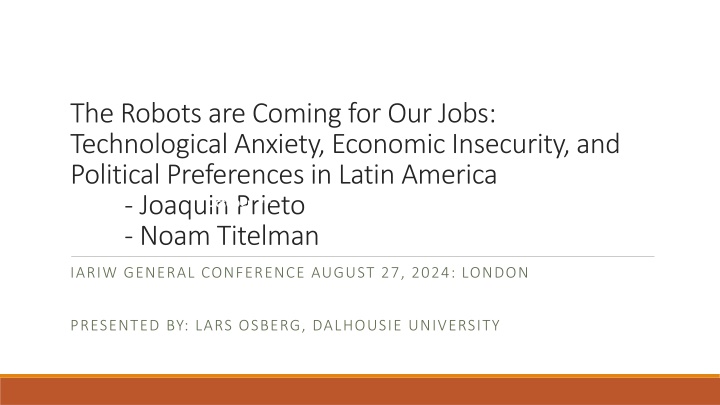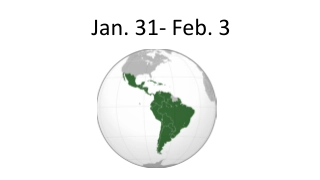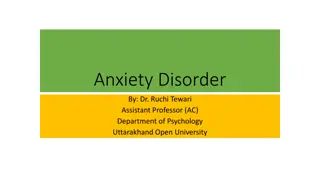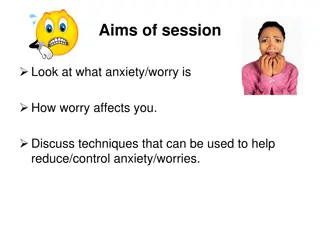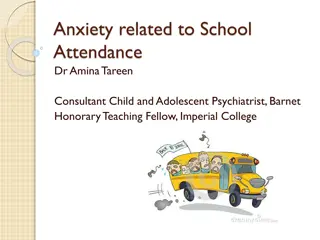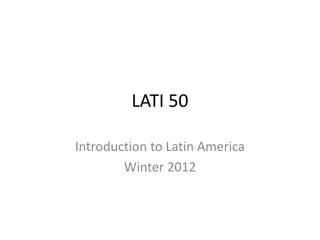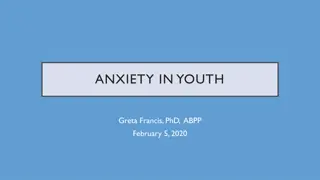Technological Anxiety in Latin America: Impact on Political Economy
Relationship between technological anxiety, economic insecurity, and political outcomes in Latin America. Delve into individual and collective evaluations of job loss fears, societal concerns, and political instability implications of technological advancements.
Download Presentation

Please find below an Image/Link to download the presentation.
The content on the website is provided AS IS for your information and personal use only. It may not be sold, licensed, or shared on other websites without obtaining consent from the author.If you encounter any issues during the download, it is possible that the publisher has removed the file from their server.
You are allowed to download the files provided on this website for personal or commercial use, subject to the condition that they are used lawfully. All files are the property of their respective owners.
The content on the website is provided AS IS for your information and personal use only. It may not be sold, licensed, or shared on other websites without obtaining consent from the author.
E N D
Presentation Transcript
The Robots are Coming for Our Jobs: Technological Anxiety, Economic Insecurity, and Political Preferences in Latin America - Joaquin Prieto - Noam Titelman October 2nd IARIW GENERAL CONFERENCE AUGUST 27, 2024: LONDON PRESENTED BY: LARS OSBERG, DALHOUSIE UNIVERSITY
Does Technical Change in 2020s Politically Destabilize Capitalism? Old Days Optimism Capitalism as Steady State Growth with Factor-Augmenting Tech Change? Modern Worries The "Populism" of the (many) "Left Behind": What are the Political Economy implications of Technological Change ? P & T examine: Technological anxiety in Latin America & relationship with economic insecurity & political outcomes Disentangle individual (egocentric) and collective (socio-tropic) evaluations Emphasize multiplicity of political responses CONTEXT IS CRUCIAL TO IMPACTS "Welfare State H0 : Full Employment Macro + generous UI minimizes consequences of job Loss Neo-Liberal Agenda: ceteris paribus assumed Most Research the EU or USA BUT Tech change affects everyone everywhere & most of world does NOT live there Use the 2020 Latinobarometro survey: 20,000 respondents in 18 Latin American countries
Figure 2: Proportion of respondents that declare that they strongly agree In 10 years from now robots will have taken away my work place (job) (individual) Artificial intelligence and robots will make disappear more jobs than they will create (Collective)
Technological Anxiety: workers fear that jobs and associated traditional ways of life are under threat from technological advances TWO elements in tech anxiety: LONG History of importance of both Egotropic: What might happen to me? Fears of consequences of personal job loss A left political impact if individual economic insecurity => greater push for redistributive social insurance ?? Sociotropic: What sort of society will I be living in? Dislike of Dehumanizing of production & interaction? Worries about political instability impacts of tech change? People who are hungry and out of a job are the stuff of which dictatorships are made. Roosevelt (1944) State of the Union Message to Congress," Jan 11, Status Threat to Natural Order of Things (mingled with anxiety re social changes ? e.g. gender / family ??) A right political impact if Making XX Great Again => traditionalist nostalgia ??? Anxiety always Conditional on Self-Perception of Individual Ability to Cope & Existence of Insurance (Social & Individual)
What worries about the future? Anxiety My Job [1 to 4] In 10 years time robots will have taken away my workplace . Anxiety Society Jobs [1 to 4] Artificial intelligence and robots will make disappear more jobs than it will create . Anxiety over one s own technological abilities [1 to 4] I am capable of managing new technologies in my job
Unpacking Anxieties ? Table 2 presents Coefficient estimates for individual and collective technological anxiety predicted by demographics, socioeconomic and cultural variables Can be read 2 ways: P & T: not distributed uniformly across the population LO: Most Everybody : R-Squared Individual = 0.0024 Collective = 0.0077 & most variables insignificant or very small if significant Means on [1 to 4 ] scale of 2.4 & 2.7 imply considerable anxiety but pervasive & unexplained (except black/mulatto) Table 3 Presents Coefficient estimates for self-estimate of capability to cope with tech change predicted by individual and collective technological anxiety + demographics, socio-economic and cultural variables younger respondents: are more collectively anxious & have highest level confidence in their own technological skills,
Economic Insecurity: a Mediating Variable Tech Anxiety => Econ Insecurity => Political response Index of Economic Insecurity Factor Analysis used to get loadings on risks and buffers Risk of losing employment (.55) Perception of future personal economic situation (.28) Perceived capability of personal savings (.55) Perceived existence of substantive social security net (.16)
Latinobarometro: What to Explain? Ideological position: 0 to 10 self-placement scale 0 = the extreme left & 10 = the extreme right. (Mean = 4.96, SD = 3.0) Respondents were asked to place themselves on this scale according to their personal political beliefs Undemocratic preference: level of agreement [ 1 to 4 ] with: I wouldn t mind if an undemocratic government came to power if it could solve the problems . (Mean = 2.5, SD = 0.85) surely contingent on national context!! Support for democracy: the level of agreement [ 0, 1 ] with: Democracy is preferable to any other form of government . Mean = 0.498, SD = 0.5 Comparison with EU responses would be useful!
Hypotheses: (H1): Individuals with higher individual technological anxiety for their job (egocentric) will have higher levels of economic insecurity. (H2): Individuals with higher economic insecurity identify more with the left (H3a): Individually assessed levels of technological anxiety predicts more left leaning positions. (H3a.1): mediated through economic insecurity (as implied by H2) (H3b): Collectively assessed levels of technological anxiety are positively associated to higher undemocratic government preferences. (H3c): Collectively assessed levels of technological anxiety are positively associated to more right leaning positions. [(H3b.1) & (H3c.1): without mediation of economic insecurity]
Econometrics Stepwise OLS regressions: where Y = Pol Position (Y1); Undemocratic Government Preference (Y2); Support Democracy Preference (Y3) 1. Economic Insecurity <= Tech Anxiety (individual) & (collective), controlling demographic, socioecon, cultural, country 2. Y <= Tech Anxiety (individual) & (collective) + Controls 3. Y <= Economic Insecurity, Tech Anxiety (individual) & (collective) + Controls Robustness checks using Structural Equation Modeling (SEM).
Conclusions: More individual tech anxiety predicts greater economic insecurity (supports H1), Increased economic insecurity predicts more left-wing self-identification (confirming H2) Collective tech anxiety (re societal job impact of tech change) has no significant relationship with left / right partial refutation of H3b Higher levels of technological anxiety both egocentric & sociotropic correlate with authoritarian preference anxiety towards technological change can be associated with a greater inclination to maintain the status quo. .. a preference for less democratic forms of government, where citizens might feel that authoritarian regimes are better equipped to manage the uncertainties and perceived threats posed by technological advancements. Not clear if tech anxiety will produce Left or Right Populism & Authoritarianism
[1] Country Fixed Effects ? [2] Artificial Intelligence & Middle-Class Insecurity ? [1] Implicit H0 : Common marginal impact of RHS variables intercept shifts for different countries BUT explaining the heterogeneity of Latin American political economy is surely the BIG issue PLUS Immigrant Anxiety depends on local % moving & whether country is immigration origin or destination Not minding end of democracy if it could solve the problems depends on size & type of current local problems Policies to reduce economic insecurity vary within Latin America does that change democratic preferences ? [2] Mechanization / Robots has long meant loss of manual working-class jobs But AI impacts on white-collar middle-class jobs are the coming new reality, everywhere Do manual & white-collar workers have similar / different anxieties &/or political responses to economic insecurity?
Please continue !! All of humanity will be affected by the new types of problems that new technologies produce Most people do not have much of the social insurance protection that a welfare state can provide The Political Economy of Technological Change is hugely important and attention to world outside EU / USA is long overdue
individual technological anxiety may be more closely tied to immediate, personal concerns, such as fears of material deprivation, while collective technological anxiety might reflect broader societal concerns, such as status anxiety, where individuals with higher income and education perceive a potential threat to their social standing . But is threat to social standing not individual & personal ? Don t associated traditional ways of life include talking to humans & not AI Bots ? We have come to a clear realization of the fact that true individual freedom cannot exist without economic security and independence. "Necessitous men are not free men." People who are hungry and out of a job are the stuff of which dictatorships are made. Roosevelt (1944) Roosevelt, Franklin Delano (1944) "State of the Union Message to Congress," January 11, 1944. http://www.fdrlibrary.marist.edu/archives/address_text.html
